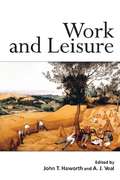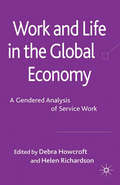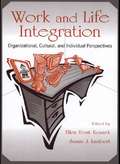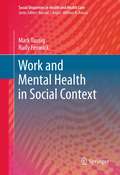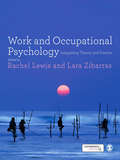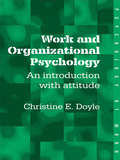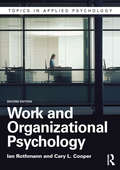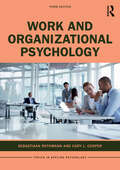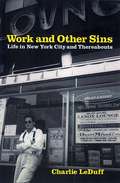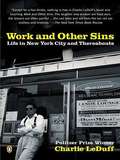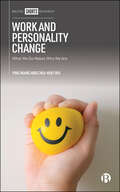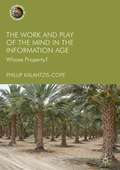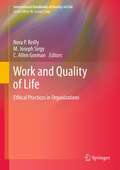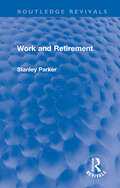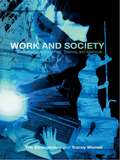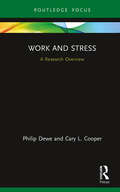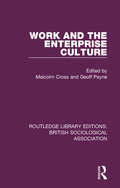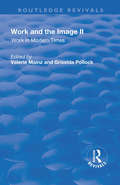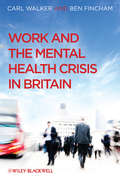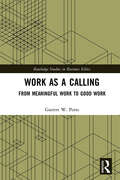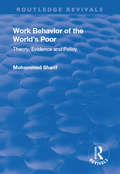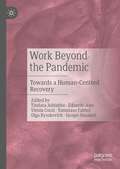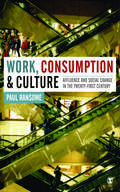- Table View
- List View
Work and Leisure
by A. J. Veal John T. HaworthGlobalization, economic development and changes in social environments have put the relationships between work, leisure, social structure and quality of life under the spotlight. Profound transformations in the nature and organization of work are occurring, with potentially far-reaching social and economic consequences. Increasingly, organizations demand greater flexibility from their workforces and are introducing new technologies and practices in response to global competitive pressures. At the same time many employees are experiencing long working hours, increasing workloads and job insecurity, along with the challenge of balancing work and domestic responsibilities. These changes threaten long-term gain in leisure time while, simultaneously, the leisure environment is also changing radically, as we see increasing commercialization and professionalization of leisure services and experiences, the influence of the Internet, the rise of gambling and the decline of community-based activity. Exploring all of these issues, this book brings together specially commissioned chapters from international experts in a wide range of disciplines concerned with work, leisure and well-being. Each author takes stock of the current position, identifies core practical and theoretical issues and discusses possible future trends in order to provide an invaluable resource for all policy-makers, educators, employers and researchers in the field.
Work and Life in the Global Economy
by Debra Howcroft Helen RichardsonThis book aims to explore the social and cultural issues within the economic changes that have given rise to service work. Written by specialists in their respective fields, this book draws together authors from interdisciplinary areas that are carrying out significant research into gender and service work within an international context.
Work and Life Integration: Organizational, Cultural, and Individual Perspectives (Applied Psychology Series)
by Ellen Ernst Kossek Susan J. LambertWork-family researchers have had much success in encouraging both organizations and individuals to recognize the importance of achieving greater balance in life. Work and Life Integration addresses the intersect between work, life, and family in new and interesting ways. It discusses current challenges in dealing with work-life integration issues and sets the stage for future research agendas. The book enlightens the research community and informs the public debates on how workplaces can be made more family sensitive by providing contributions from psychologists, sociologists, and economists who have not shied away from asserting the policy implications of their findings.This text appeals to both practitioners and academics interested in seeking ways to create meaningful lives.
Work and Mental Health in Social Context
by Mark Tausig Rudy FenwickAnyone who has ever had a job has probably experienced work-related stress at some point or another. For many workers, however, job-related stress is experienced every day and reaches more extreme levels. Four in ten American workers say that their jobs are "very" or "extremely" stressful. Job stress is recognized as an epidemic in the workplace, and its economic and health care costs are staggering: by some estimates over $ 1 billion per year in lost productivity, absenteeism and worker turnover, and at least that much in treating its health effects, ranging from anxiety and psychological depression to cardiovascular disease and hypertension. Why are so many American workers so stressed out by their jobs? Many psychologists say stress is the result of a mismatch between the characteristics of a job and the personality of the worker. Many management consultants propose reducing stress by "redesigning" jobs and developing better individual strategies for "coping" with their stress. But, these explanations are not the whole story. They don't explain why some jobs and some occupations are more stressful than other jobs and occupations, regardless of the personalities and "coping strategies" of individual workers. Why do auto assembly line workers and air traffic controllers report more job stress than university professors, self-employed business owners, or corporate managers (yes, managers!)? The authors of Work and Mental Health in Social Context take a different approach to understanding the causes of job stress. Job stress is systematically created by the characteristics of the jobs themselves: by the workers' occupation, the organizations in which they work, their placements in different labor markets, and by broader social, economic and institutional structures, processes and events. And disparities in job stress are systematically determined in much the same way as are other disparities in health, income, and mobility opportunities. In taking this approach, the authors draw on the observations and insights from a diverse field of sociological and economic theories and research. These go back to the nineteenth century writings of Marx, Weber and Durkheim on the relationship between work and well-being. They also include the more contemporary work in organizational sociology, structural labor market research from sociology and economics, research on unemployment and economic cycles, and research on institutional environments. This has allowed the authors to develop a unified framework that extends sociological models of income inequality and "status" attainment (or allocation) to the explanation of non-economic, health-related outcomes of work. Using a multi-level structural model, this timely and comprehensive volume explores what is stressful about work, and why; specifically address these and questions and more: -What characteristics of jobs are the most stressful; what characteristics reduce stress? -Why do work organizations structure some jobs to be highly stressful and some jobs to be much less stressful? Is work in a bureaucracy really more stressful? -How is occupational "status" occupational "power" and "authority" related to the stressfulness of work? -How does the "segmentation" of labor markets by occupation, industry, race, gender, and citizenship maintain disparities in job stress? - Why is unemployment stressful to workers who don't lose their jobs? -How do public policies on employment status, collective bargaining, overtime affect job stress? -Is work in the current "Post (neo) Fordist" era of work more or less stressful than work during the "Fordist" era? In addition to providing a new way to understand the sociological causes of job stress and mental health, the model that the authors provide has broad applications to further study of this important area of research. This volume will be of key interest to sociologists and other researchers studying social stratification, public health, political economy, institutional and organizational theory.
Work and Occupational Psychology: Integrating Theory and Practice
by Rachel Lewis Lara ZibarrasWork and Occupational Psychology is the ideal companion for any student of the field, whether they are studying for a postgraduate qualification with a view to working in OP, or taking the subject as part of a wider degree programme at any level.<P><P> Written by a team of experts and with contributions from seminal academics and leading practitioners, this text provides the concise link between theoretical learning and the key practical skills needed to increase your grades and your employability.<P> Features of this book include:<P> - Structured around the eight core areas of Occupational Psychology to ensure a rounded overview and enables students to dip in and out of the text<P> - Assumes no prior knowledge of the subject making it ideal for anyone studying Occupational Psychology for the first time<P> - Provides a contemporary and future-facing account of the field, including cutting edge research and reflections on future of Occupational Psychology<P> - Reflects the realities of a global workplace through discussion of international and cross-cultural issues and a range of international case studies<P> - Engages critically with the subject to encourage analytical thinking<P> - Comes with a range of accessible in-text and online learning features including essay/exam questions, access to full text SAGE journal articles, podcasts and a glossary.<P> Visit the Companion Website at www.sagepub.co.uk/zibarras
Work and Organizational Psychology: An Introduction with Attitude
by Christine DoyleIn this unique text, Christine Doyle provides the student with a cutting-edge introduction to the field of work and organizational psychology. The main focus is on recent changes that have occurred in the world of work, incorporating their causes, consequences, proposed solutions to the associated problems, and above all, the challenges they pose for work and organizational psychology.Among the topics covered are motivation at work, the concept of stress, and the causes of individual accidents and organizational disasters. Solutions to such problems might include lifelong learning and training, performance management, career development, and employee assistance programmes.This lively, provocative, and highly readable book will be an essential resource for advanced undergraduate and postgraduate students of work and organizational psychology, as well as business management students, managers and anyone with an interest in human resources management.
Work and Organizational Psychology
by Ian Rothmann Cary L. CooperPsychologists have been fascinated by the world of work, and the changing relationship between people, technology and the workplace, since the onset of the industrial revolution. And in providing a complete and contemporary overview of this evolving and fascinating field, the new edition of Work and Organizational Psychology is the perfect textbook, outlining not only the key theoretical ideas, but also how they relate to the role of psychologists advising today’s organizations. The only textbook to integrate the fields of HRM and organizational behaviour, the new edition is thoroughly revised to cover new technological advances such as virtual workplaces and virtual employees. In an era of rapid socio-economic change, there is also expanded coverage of the role of workplace diversity, employee commitment and globalization, as well as updated chapters on key concepts such as motivation, leadership, group behaviour and well-being at work. Also including a chapter on career development, the book is supported by a range of pedagogical features, spotlighting issues of theoretical, ethical or contemporary interest, whilst also enabling students to engage in active learning. Lucid and comprehensive, the second edition of Work and Organizational Psychology will be the cornerstone for any student of this dynamic field.
Work and Organizational Psychology (Topics in Applied Psychology)
by Sebastiaan Rothmann Cary L. CooperProviding a complete and contemporary overview of the evolving and fascinating world of work, this new edition of Work and Organizational Psychology is the perfect textbook, outlining not only key theoretical ideas, but how they relate to the role of psychologists advising today’s organizations. Integrating the fields of human resource management and organizational behaviour, the text begins with a chapter to give the reader an insight into the domain of work and organizational psychology, the development of the field of work and organizational psychology, tasks and competencies of organizational and work psychologists, and careers in work and organizational psychology. The remainder of the book is divided into thirteen chapters which address the core areas of work and organizational psychology. The book is supported by a range of pedagogical features, spotlighting issues of theoretical, ethical, or contemporary interest, whilst also enabling students to engage in active learning.
Work and Other Sins: Life in New York City
by Charles LeduffWork and Other Sins is filled to burst with stories of the fascinating, one-of-a-kind characters who populate the modern metropolis. In these pages we meet a Long Island used-car salesman; a professional Santa; the men who change the light bulbs atop the Empire State Building; a Sinatra imitator; a retired Harlem chorus-line girl; a lighthouse keeper; a saloon priest; Latin lovers; a host of barroom regulars; and myriad others-all of whom present their take on working, drinking, gambling, dying, and countless other facts of life. Charlie LeDuff takes us to the watering holes, prisons, veterans' hospitals, firehouses, apartment buildings, baseball fields, and graveyards that make up the landscape of modern life. Also included is LeDuff's acclaimed series of articles on Squad One, the Brooklyn firehouse that suffered devastating losses on September 11, as well as his Pulitzer Prize-winning piece on workers in a North Carolina slaughterhouse. LeDuff captures the spirit of the people and places he profiles with a dead-on feel for character and idiom and his signature wry wit. But more than that, LeDuff lets his characters speak for themselves. What results is at turns riotous, dirt-under-the-nails, contemplative, salty, joyous, whiskey tinged-an utterly unique vision of life in the Big Apple and beyond.
Work and Other Sins: Life in New York City and Thereabouts
by Charlie LeduffFrom the New York Times bestselling author of Detroit: An American Autopsy"Except for a few drinks, nothing is free in Charlie LeDuff's blunt and touching Work and Other Sins. The laughter and wisdom are hard won, the lessons are often painful... the sad tales and wit from the bar rail are endless and timeless." --The New York Times Book ReviewCharlie LeDuff is that rare breed of news reporter--one who can cover hard-to-get-at stories in a unique and deeply personal style. In Work and Other Sins, he gives his incomparable take on New York City and its denizens--the bars, the workingmen, the gamblers, the eccentrics, the lonesome, and the wise. Whether writing about a racetrack gambler, a firefighter with a broken heart, or a pair of bickering brothers and their Coney Island bar, LeDuff takes the reader into the lives of his subjects to explore their fears, faults, and fantasies as well as their own small niches of the globe. The result is an at turns riotous, dirt-under-the-nails, contemplative, salty, joyous, whiskey-tinged, and utterly unique vision of life in the Big Apple.
Work and Other Sins
by Charlie LeduffFrom the New York Times bestselling author of Detroit: An American Autopsy "Except for a few drinks, nothing is free in Charlie LeDuff's blunt and touching Work and Other Sins. The laughter and wisdom are hard won, the lessons are often painful. . . the sad tales and wit from the bar rail are endless and timeless. " --The New York Times Book Review Charlie LeDuff is that rare breed of news reporter-one who can cover hard-to-get-at stories in a unique and deeply personal style. In Work and Other Sins, he gives his incomparable take on New York City and its denizens-the bars, the workingmen, the gamblers, the eccentrics, the lonesome, and the wise. Whether writing about a racetrack gambler, a firefighter with a broken heart, or a pair of bickering brothers and their Coney Island bar, LeDuff takes the reader into the lives of his subjects to explore their fears, faults, and fantasies as well as their own small niches of the globe. The result is an at turns riotous, dirt-under-the-nails, contemplative, salty, joyous, whiskey-tinged, and utterly unique vision of life in the Big Apple. .
Work and Other Sins
by Charlie LeduffFrom the New York Times bestselling author of Detroit: An American Autopsy "Except for a few drinks, nothing is free in Charlie LeDuff's blunt and touching Work and Other Sins. The laughter and wisdom are hard won, the lessons are often painful... the sad tales and wit from the bar rail are endless and timeless." --The New York Times Book Review Charlie LeDuff is that rare breed of news reporter--one who can cover hard-to-get-at stories in a unique and deeply personal style. In Work and Other Sins, he gives his incomparable take on New York City and its denizens--the bars, the workingmen, the gamblers, the eccentrics, the lonesome, and the wise. Whether writing about a racetrack gambler, a firefighter with a broken heart, or a pair of bickering brothers and their Coney Island bar, LeDuff takes the reader into the lives of his subjects to explore their fears, faults, and fantasies as well as their own small niches of the globe. The result is an at turns riotous, dirt-under-the-nails, contemplative, salty, joyous, whiskey-tinged, and utterly unique vision of life in the Big Apple.
Work and Personality Change: What We Do Makes Who We Are
by Ying Wang Chia-Huei WuCan your job change your personality? While traditionally personality has been considered fixed and stable, recent thinking indicates that this is not the case. Personality can be changed by various work and vocational experiences, such as employment conditions, career roles, job characteristics and training or interventions. Drawing on a wide array of research in the field, Wang and Wu provide a conceptual overview on how personality can be changed at work by societal, organisational and job-related factors, while considering how individuals can take an active approach in changing their personality at work.
The Work and Play of the Mind in the Information Age: Whose Property? (Frontiers of Globalization)
by Phillip Kalantzis-CopeThis book tells a series of living stories about a domain of social activity, "the work and play of the mind," in a particular historical epoch: the "information age. " The stories concern political processes and movements as varied as the World Trade Organization's Trade-Related Aspects of Intellectual Property Rights, China's Great Firewall, practices of image sharing in social media, Occupy Wall Street, The Arab Spring, The Alt-Right, and the use of geographical indications by indigenous peoples and farmers to defend their lifestyles. In its theoretical analysis, the book illuminates four alternative political agendas for the work and play of the mind. These four "propertyscapes" represent competing visions for social life, framing projects for collective political action that are at times competing, at times overlapping. The author prompts us to consider whose property is the work and play of the mind, as well as addressing larger questions regarding the framing of political space, the kinds of political communities we may need for the future, and the changing place of the work and play of the mind within these social imaginaries. The book will be of interest to students and scholars across a range of disciplines including media and communications, arts and design, law, politics and interdisciplinary social sciences.
Work and Quality of Life
by C. Allen Gorman Nora P. Reilly M. Joseph SirgyEmployees have personal responsibilities as well as responsibilities to their employers. They also have rights. In order to maintain their well-being, employees need opportunities to resolve conflicting obligations. Employees are often torn between the ethical obligations to fulfill both their work and non-work roles, to respect and be respected by their employers and coworkers, to be responsible to the organization while the organization is reciprocally responsible to them, to be afforded some degree of autonomy at work while attending to collaborative goals, to work within a climate of mutual employee-management trust, and to voice opinions about work policies, processes and conditions without fear of retribution. Humanistic organizations can recognize conflicts created by the work environment and provide opportunities to resolve or minimize them. This handbook empirically documents the dilemmas that result from responsibility-based conflicts. The book is organized by sources of dilemmas that fall into three major categories: individual, organizational (internal policies and procedures), and cultural (social forces external to the organization), including an introduction and a final integration of the many ways in which organizations can contribute to positive employee health and well-being. This book is aimed at both academicians and practitioners who are interested in how interventions that stem from industrial and organizational psychology may address ethical dilemmas commonly faced by employees.
Work and Retirement (Routledge Revivals)
by Stanley ParkerIn the early 1980s world recession and widespread unemployment had accentuated an existing trend – more people retiring from work early and living longer after doing so. Some were adequately prepared for a life of well-earned ‘leisure’ in retirement, but too many were not. The policies of employers, unions and governments on retirement needed to be challenged in societies where work opportunities were collapsing but where leisure activities and values were not yet strong enough to take their place. Originally published in 1982, Dr Parker, a sociologist, provides a careful and critical examination of what we knew about retirement and discusses possible alternative answers to the various problems involved at the time. The history of retirement is first considered, followed by a conceptual analysis of types of retirement. There are chapters on preparation for retirement, the capacity of older people to work, and on the varying experiences of retirement. Separate consideration is given to the question of work after retirement age and whether retirement is actually experienced as leisure. The concluding chapter examines various policy alternatives for dealing with the problems raised earlier in the book. Work and Retirement was intended for students of industrial sociology and industrial psychology, for personnel and human resource professionals, for trade unionists and for all those who had an interest in understanding the developments in the field of retirement and the older working population. Now it can be read in its historical context.
Work and Society: Sociological Approaches, Themes and Methods
by Tim Strangleman Tracey WarrenWork and Society is an important new text about the sociology of work and employment. It provides both undergraduate and postgraduate students of sociology, business and politics, with a firm and enjoyable foundation to this fascinating area of sociology, giving comprehensive coverage of traditional areas of the sub-discipline as well as new trends and developments. The book is divided into three complementary and interconnected sections – investigating work, work and social change and understanding work. These sections allow readers to explore themes, issues and approaches by examining how sociologists have thought about, and researched work and how the sub-discipline has been influenced by wider society itself. Novel features include separate chapters on researching work, domestic work, unemployment and work, and the representation of work in literary and visual media.
Work and Stress: A Research Overview (State of the Art in Business Research)
by Philip Dewe Cary L CooperStress is a leading cause of ill health in the workplace. This shortform book analyses, summarises and contextualises research around stress at work. The book begins by exploring the impact and challenges of technology and the challenging and changing contours and boundaries of the nature of work. Using a behaviour lens, the authors draw on cyberpsychology to illuminate the choices we make to balance life, work and wellbeing. The changing nature of work is analysed, shifting structures and boundaries explored and the stress consequences of such themes as the gig economy and precarious work are also included in the book. A compelling framework for researchers of work, organisation and psychology, this concise book is also valuable reading for reflective practitioners, seeking to understand the importance of wellbeing in the workplace
Work and the Enterprise Culture (Routledge Library Editions: British Sociological Association #12)
by Malcolm Cross Geoff PayneWork and Enterprise Culture examines the world of work in the light of the major changes that have occurred over the last decade. In particular, the book focuses on what is understood by the term the ‘enterprise culture’ and considers what impact, if any, this concept has on traditional work practices. A major feature of the book is that the essays also address questions of equal opportunity on grounds of gender and race, and examine the effects of the coming of the ‘enterprise culture’ has had on these concerns.
Work and the Image: Volume 2: Work in Modern Times - Visual Mediations and Social Processes
by Valerie Mainz Griselda PollockThis title was first published in 2000. Published in two volumes, "Work and the Image" addresses a critical theme in contemporary social and cultural debates whose place in visual representation has been neglected. Ranging from Greek pottery to contemporary performance, and exploring a breadth of geo-national perspectives including those of France, Britain, Hungary, Soviet Russia, the Ukraine, Siberia and Germany, the essays provide a challenging reconsideration of the image of work, the meaning of the work process, and the complex issues around artistic activity as itself a form of work even as it offers a representation of labour. With a shared focus on the 20th century, the era of modernity and its postmodern aftermath, the essays in this volume examine the diverse ways in which the social relations of work in industrial societies from both capitalist and socialist regimes were publicly and privately mediated by changing forms of visual representation. The authors discuss traditional analyses of the image of the worker in the light of contemporary critical theories that address the question of the subjectivity of the worker in relation to class, gender, nationhood and the concept of modernity.
Work and the Mental Health Crisis in Britain
by Carl Walker Ben FinchamBased on recent data gathered from employees and managers, Work and the Mental Health Crisis in Britain challenges the cultural maxim that work benefits people with mental health difficulties, and illustrates how particular cultures and perceptions can contribute to a crisis of mental well-being at work. <P><P> Based on totally new data gathered from employees and managers in the UK Presents a challenge to much of the conventional wisdom surrounding work and mental health Questions the fundamental and largely accepted cultural maxim that work is unquestionably good for people with mental health difficulties Illustrates how particular cultures of work or perceptions of the experience of work contribute to a crisis of mental well-being at work Fills a need for an up-to-date, detailed work that explores the ways that mental health and work experiences are constructed, negotiated, constrained and at times, marginalised Written in a style that is detailed and informative for academics and professionals who work in the mental health sphere, but also accessible to interested lay readers
Work as a Calling: From Meaningful Work to Good Work (Routledge Studies in Business Ethics)
by Garrett W. PottsAmidst the exponentially growing interest in "work as a calling," contemporary discussions have taken an individualistic turn away from the earlier prosocial character that once marked this orientation to work. Now, discussions about "work as a calling" mostly prioritize personal fulfilment via the pursuit of deeply "meaningful work." Excessive focus has been placed on the experience of meaningful work in ways that are detached from the genuinely good workplace ends that allow for such a meaningful experience to ensue. This book provides a novel paradigm for reimagining the idea of "work as a calling," which serves as a corrective that better supports the individuals’ search for meaning and their contribution to the common good, arguing that the two go hand in hand, and so they cannot be separated. Thus, the key idea captured herein is not simply that scholars have misunderstood the very notion of "work as a calling" by implying that it is essentially just synonymous with meaningful work, but, even more importantly, the point is that scholars and laypersons alike often fail to realize how true meaning ensues as a result of a genuine concern for contributing to human flourishing and the common good through one’s work. Providing a new perspective on "work as a calling" by examining the issue from the perspective of morality rather than self-actualization, this volume will be of interest to researchers, academics, professionals, and students in the fields of business ethics, management, leadership, and organizational studies.
Work Behavior of the World's Poor: Theory, Evidence and Policy
by Mohammed SharifThis title was first published in 2003. The working poor of the world are observed to engage in long hours in hard jobs and to work more if wages are further reduced. Mainstream economics brushes off this tendency to increase labour supply as wages fall as perverse because it does not fit the conventional wisdom and tries to explain it as a result of "subsistence mentality", "limited aspiration", or "target income" behaviour of the poor. This however ignores the observed fact that the poor work long hard hours but most of the time, fail to meet their minimum needs of subsistence and live impoverished lives in absolute poverty deficient of both food and physical rest. This book postulates that the observed behaviour is the result of economic distress the working poor suffer and analyses it as a rational behaviour using the conventional utility maximization framework and derives both theoretical and empirical results consistent with the observation. This book aims to correct a serious misconception persisting in the literature relating to the working-poor labour-supply behaviour that is almost universally observed. It also goes onto develop, using the supply function, a methodology to determine the standard of subsistence income and physical rest for the worker.
Work Beyond the Pandemic: Towards a Human-Centred Recovery
by Tindara Addabbo Edoardo Ales Ylenia Curzi Tommaso Fabbri Olga Rymkevich Iacopo SenatoriThis book addresses the impact of Covid-19 on employment relations and provides a reconstruction and a critical assessment of the measures enacted worldwide to tackle the economic and social crisis triggered by the global health emergency. The pandemic has been a booster of critical issues that for years have been silently shaping society and the labor market and so it can represent an opportunity to relaunch a critical analysis on the future of work.Beginning from this assumption, this book collects contributions from different disciplines, including law, economics and organization theory. It covers topics such as the measures enacted to protect workers’ health and cushion the labour, the new inequalities that emerged during the pandemic and the strategies to construct a sustainable and human-centred development in the post pandemic scenario. It is highly relevant to scholars and students of organisation studies, resilience, the labour market and labour law.
Work, Consumption and Culture: Affluence and Social Change in the Twenty-first Century
by Dr Paul RansomeThe central question in Work, Consumption and Culture is whether consumption has now displaced production as the defining factor in the lives of those in the industrialized West. This book offers a comprehensive review of the key issues in the production/consumption debate, and where it might lead in the future. Key to Paul Ransome's argument is the hypothesis that affluence is the crucial factor in the shift away from work and towards consumption. Uniquely emphasizing the links between work, consumption and culture, rather than keeping each element separate, the author looks at: - the changing significance of work in society - the meaning, growth and significance of affluence - the growing importance of consumption as a source of identity and its implications the impact of the shift to consumption on work/life balance Work, Consumption and Culture engages the reader with its lively debating style. It is an essential introduction for sociology and cultural studies students on courses relating to consumption and the role of work in contemporary society. `This book offers a balanced account of the changing importance of work and consumption in contemporary industrial society. Clearly written, the author identifies the central role that affluence plays in the relationship between work and consumption, and in the development of social life and individual identity' - Professor Paul Blyton, Cardiff Business School
